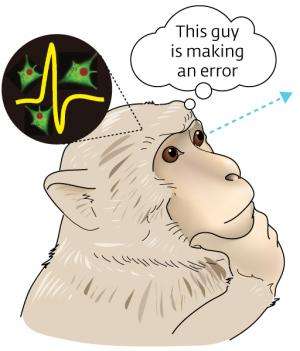Activity of individual neurons in the medial frontal cortex of monkeys was recorded while they observed their partner making errors. Credit: 2012 Masaki Isoda, RIKEN Brain Science Institute
Humans and other animals learn by making mistakes. They can also learn from observing the mistakes of others. The brain processes self-generated errors in a region called the medial frontal cortex (MFC) but little is known about how it processes the observed errors of others. A Japanese research team led by Masaki Isoda and Atsushi Iriki of the RIKEN Brain Science Institute has now demonstrated that the MFC is also involved in processing observed errors.
The team studied the brains of monkeys while the animals performed the same task. Two monkeys sat opposite each other and took turns to choose between a yellow and green button, one of which resulted in a liquid reward for both. Each monkey's turn consisted of two choices.
After blocks of between 5 and 17 choices, the button that resulted in reward was switched unpredictably, usually causing an error on the next choice. The choices made by each monkey immediately after such errors, or errors that were random, showed that they used both their own errors and their partner's to guide their subsequent choices. While the monkeys performed this task, the researchers recorded activity of single neurons in their brains.
In this way they were able to determine which behavioural aspect was most closely associated with each neuron's activity, explains Isoda. "We found that many neurons in the medial frontal cortex were not activated when the monkey made an error itself, but they became active when their partner made an error." This brain activity shows that it is the MFC which processes observations of another's error, and the corresponding behavior shows that observing and processing such errors guides subsequent actions.
"Such error identification and subsequent error correction are of crucial importance for developing and maintaining successful social communities," says Isoda. "Humans are tuned into other people's mistakes not only for competitive success, but also for cooperative group living. If non-invasive techniques become available in humans, then we should be able to identify medial frontal neurons that behave similarly."
Having identified the MFC as being involved, Isoda now wants to delve deeper into the process. "The next steps will be to clarify whether the inactivation of medial frontal cortex neurons reduces the ability to identify others' errors, and to determine whether other brain regions are also involved in the processing of others' errors."
More information: Yoshida, K., Saito, N., Iriki, A. & Isoda, M. Social error monitoring in macaque frontal cortex. Nature Neuroscience 15, 1307–1312 (2012). www.nature.com/neuro/journal/v … n9/full/nn.3180.html
Journal information: Nature Neuroscience
Provided by RIKEN





















